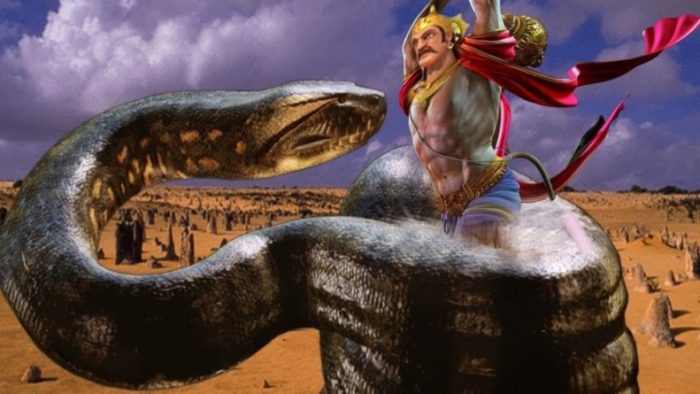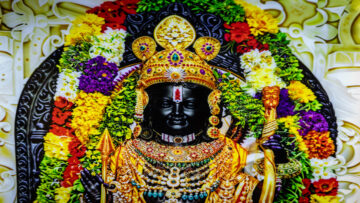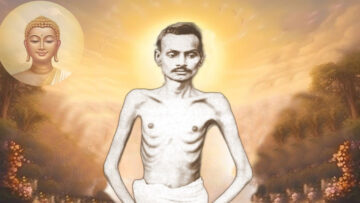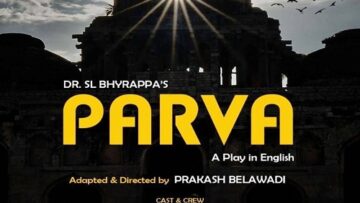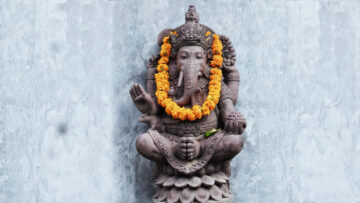Nahusha is one of the illustrious ancestors of the Kurus. He was the son of Ayus, grandson of Pururava and the father of Yayati. He appears in multiple places in the Mahabharat – there is a detailed reference to Nahusha in the Vanaparva where he is in the form of a great python, captures Bhima and engages with Yudhishtira in an enlightening conversation that relieves him from a curse. His past and the essence of it – is fully presented in the Anushasana Parva when Bheeshma guides Yudhishthira in righteousness required for a King. The journey of Nahusha’s life is full of immense insight for humanity. It’s a treatise on what blinds humanity, what sustains Dharma, and how are we to reform ourselves from a fallen state.
Nahusha was a great Rajarshi and Tapaswi. His penance earned him so much Punya that it elevated him as equivalent to Devendra. He was invited to become the Indra himself by the Devatas. Nahusha began to live in Svarga. With his penance guiding him, Nahusha continued to perform his humanly duties and divine responsibilities in a righteous manner, with equal justice. He continued to perform every single act of offering oblation to all devas.
Alas – that would not last long. In a while, Nahusha began to wear the fact that he was the Indra himself. An ounce of ego penetrated his mind which grew monstrously in no time. His performances lost their sincerity and earnestness. As a result, they resulted in nothing divine and his oblations to devatas began to falter. With his ego blinding, Nahusha went a step further. He forced the sages to be his vehicles. They were to pull him in his chariot from place to place. With this, his penance that was compiled over many years began to fall apart. His unrighteousness began to destroy him from within which Nahusha did not realize.
Much time passed. Nahusha had ordained a turn for each sage to carry him in his chariot. Once it was the turn of Sage Agastya. Sage Bhrigu came to meet the upset Agastya. They reflected upon the state of affairs. Sage Bhrigu wondered if they should be suffering this any beyond. At this, Agastya said “Oh sage Bhrigu, let us not forget that he has a boon from Lord Brahma himself. Anybody who comes in front of him becomes subservient to him. Our curses have no effect on him. We can neither curse him, nor can we push him down from Svargaloka. Oh Bhrigu, we must find a different way out, can we?”. Bhrigu said, “Oh Agastya, I am here with full knowledge of this reality. Brahma himself has sent me to you. Today, Nahusha will put you to pull the chariot. I shall end his ego and divest him from his Indra-padavi. You will see what happens today.”
On the other side, Nahusha went about with his day as usual. His day was no more filled with great acts of righteousness, rather with acts of insult to brahmins and sages. His oblations to the devatas diminished. As a result, Rakshasas had gained more power. Nahusha had begun to draw power from the Rakshasas. That day, he was in a great hurry. He sent word to Agastya for the day’s duty. Bhrigu alerted Agastya ” Oh Mahamuni, I shall hide in your shikha today, close your eyes for a moment”. Thus, he hid inside his shikha and waited for the most opportune moment.
Hiding his anger, Agastya spoke in a pleasing tone to Nahusha seeking the destination for his chariot ride. They were to go to River Saraswati. Nahusha whipped Agastya just as he would to a horse. Neither Agastya nor Bhrigu showed any anger. Agastya calmly went about with his drawing of the chariot, simply waiting for the moment. This very calmness drew Nahusha’s ire. Going over the board, he kicked Agastya on his head. That was the final straw. Bhrigu had a reason, he was invisible and Nahusha was least alert. Bhrigu immediately cursed Nahusha “Oh King, your time has come. You have simply forgotten what earned you this position. In your haste, seeking to move fast you kicked a great sage. Now, you shall fall upon earth as a Sarpa”. When he delivered the devastating curse, Bhrigu was still inside the shikha and invisible to Nahusha. The King only heard the sage’s voice. The curse took effect and Nahusha had nothing in him to deal with it. At once, Nahusha began to fall from Svarga. In moments, he was on earth as a Sarpa. In his fall, Nahusha saw his Ahankara slowly diminishing. By the time he fell on earth, he was the same old Nahusha – the righteous King but in the form of a snake, without any penance left. But his acts of righteousness in the past were so great that he did not lose his memory of the past. With his ahankara destroyed Nahusha greatly repented and sought a way out from the sages. Agastya took mercy and requested Bhrigu to provide relief. Nahusha would be relieved of his curse but not before a very long wait. His descendant after many generations, Yudhishthira, was to relieve him from his form as a Sarpa by answering questions of enquiry raised by Nahusha. At the Svarga, Shakra – who was the previous Indra, was restored as lord of the devas.
Many years later, Pandavas were in their exile. They passed through a forest called Vishakhayoopa. They were drawn by the serenity and camped there for a while. Bheema gave in to his indulgences and went on a hunting spree. Hunting being hunting, he gradually lost himself in the intoxicating spirit of the hunt and ventured into a territory that belonged to a large snake. The python was so big that even the great Bheema was stunned by its form. It occupied an entire large crater. The moment the python saw Bheema in the vicinity it grew in anger and hissed. In a whiz, it enveloped Bheema and caught him in a bind with a force that devastated even that great Bheema who had the strength of 10 thousand elephants. In one hold of the python, Bheema lost all his strength. He struggled to digest his defeat, not knowing the special boon the python had. At last Bheema set aside his ego and asked “Oh King of snakes, who are you? How could you contain a man with strength equaling 10 thousand elephants?”. He greatly lamented his comprehensive defeat.
By now the python knew who he was. “Oh, the mighty one, I have been lying here without food for long. I thank the Devatas for sending you. But Bheema, inspite of my state I shall not eat you without answering your questions. I am in this state due to my misdeeds of insulting great sages which resulted in a curse from Sage Agastya and Bhrigu. I belong to your own dynasty, Oh Bheema. I am Nahusha, son of Ayus and father of Yayati. One should not eat one belonging to the same lineage, yet I must eat you, imagine the depths to which I must have fallen. I have a boon that for a certain part of the day, none can escape once in my hold. In spite of my curse, my memory of my previous janma is intact -Bheema. The sages said that the one who responds to my questions of enquiry will relieve me from this state and their words continue to ring in my years even today. I wait for that moment.”
Bheema patiently listened. He thought his end must have come. He lamented that his brothers, mother and wife would be without his protection. He wondered if the misdeeds of Kauravas would go unpunished. On the other side, Yudhishthira sensed that his brother was in trouble. After wandering around all possible places, he eventually reached the crater and was aghast to see his brother in that helpless state. He learnt the sequence of events from Bheema and begged his ancestor Nahusha. “Oh great man, can we provide you with any other food for you so that you could release Bheema?”. Nahusha refused and threatened that his life too was in danger if he stood for long. He must eat what comes in his way. Yudhishthira sought to know about Nahusha in detail. Nahusha narrated the events of his entire life once again and repeated that if his enquiring questions were answered Bheema would be free. Yudhishthira readily accepted the challenge.
Nahusha questioned Yudhishthira on who must be deemed as a Brahmana. The duel of question and answer went for long with Nahusha finally was satisfied with Yudhishthira’s answers. A pleased Nahusha said that he could now not eat Bheema as Yudhisthira had answered everything satisfactorily. Yudhishthira was keen to get his ancestor released from this fallen state but was more eager to learn from his illustrious ancestor. His status of being a snake did not blind Yudhishthira – after all Nahusha was once elevated by Devatas as the Indra himself. He sought his advice on what actions lead to one attaining the exalted worlds. It was now Yudhishthira seeking and Nahusha guiding, and that went on for a very long. In his narration, Nahusha attained his full form gradually.
Yudhishthira wondered why such a knowledgeable person such as Nahusha sought an answer to a question from Yudhishthira in the beginning – he knew it all. Nahusha repeated the curse of the sages and the relief they provided. It was this great question and answer that released Nahusha from his state of Sarpa. He was now free from the curse and he could go back to the exalted worlds that he had attained from his good deeds of the past. At once he attained a heavenly form, sat in the chariot that came from heavens and went back to Svarga. A relieved Yudhishthira went back to the Ashrama with Bheema. Back home, Bheema was reprimanded for excessive indulgence in hunting and straying away.
Once again, this story emphasizes that one may attain Svarga but retaining it is not easy. One does not know when Ahankara steps in and takes one over. Our Ahankara can get so much better of us that we end up seeking sages to be our carriers. Such is the blindness that power and position can bring. Yet, if one has performed enough good deeds one could even demand sages to be carriers and get away with it. However, that would be a short-lived affair only, even if one had the kind of boons that Nahusha had. Great powers that we attain are not only boons, they can turn into curses in no time. Any material power is such. Our good deeds give us enough protection even as we move on the path of disaster but for a while only, until we kick Sage Agastya and end all the good that we have accumulated. That is when the hidden Bhrigu, invisible to our great powers of protection, pushes us down to be a Sarpa. At the same time, one may be a Saptarshi but may have to suffer unrighteous assault until the opponent has lost all the penance. Righteous retribution too must wait for its time. Such is the nature of accumulated power, strength and ability.
Nevertheless, it was an extraordinary punishment to Nahusha, to be a Sarpa – with limited movement, a very long life, having to indiscriminately eat what comes in the way, having immense power but without the ability to do anything substantial (much less righteous), with all memory of a deep past and perspective but without being able to put anything to meaningful action. But every state of indignity has a relief. It is here that we have a beautiful definition of what a release from a curse means. It is when you find your match in terms of prowess – the power of Bheema and the perspective of Yudhishthira. The great conversation between them results in Yudhishthira, the man of the future, invoking the divine abilities of Nahusha. Nahusha knows his divinity but in the weight of his body and immense strength is simply not able to invoke it. In his conversation with Yudhishthira, Nahusha overcomes the limit of his cursed body and assumes a form that merits his divinity. At the same time, Yudhishthira gains great clarity from Nahusha. The great ancestor has successfully passed on his perspective to an illustrious descendent – thus has contributed to the lineage’s greatness. In readying Yudhishthira for the future, Nahusha is released from his curse. Thus, the past, the present and the future must meet purposefully to nullify the ill-effects of the past and create a righteous future – setting it firmly in the path of Ruta. That is when a curse is relieved – when we create a good future, that is how one becomes vimukta from paapa. This is re-iterated once again in the story of Nahusha, just as saw in the stories of Yayati, Jaratkaru and Astika.
There is a third dimension. Why did Nahusha stray from his path in his stint as Indra even though he was a man of such righteous nature as a King? The story contains an immense insight of great relevance for humanity. Nahusha, no doubt, was a righteous king, a man of great penance and attained Indra padavi through his righteous acts. But, once in Indra padavi, Nahusha began to relish and indulge in it without a sense of renunciation. Dharma sustains itself for long only under the protective coverage of Moksha, otherwise it tends to slip. The larger goal of life must be renunciation and striving for Moksha. Nahusha rediscovers this emphasis for himself, eventually, in his conversation with Yudhishthira – in the discussion of who a genuine brahmana/sage is and the nature of the Parabrahma vastu. Thus, he sets himself firmly in the path of renunciation in the guidance he provides to the future that is Yudhishthira. Hence, he regains his divine form and the right to be back to the exalted worlds.
Such is the nature of life.
Disclaimer: The opinions expressed in this article belong to the author. Indic Today is neither responsible nor liable for the accuracy, completeness, suitability, or validity of any information in the article.

